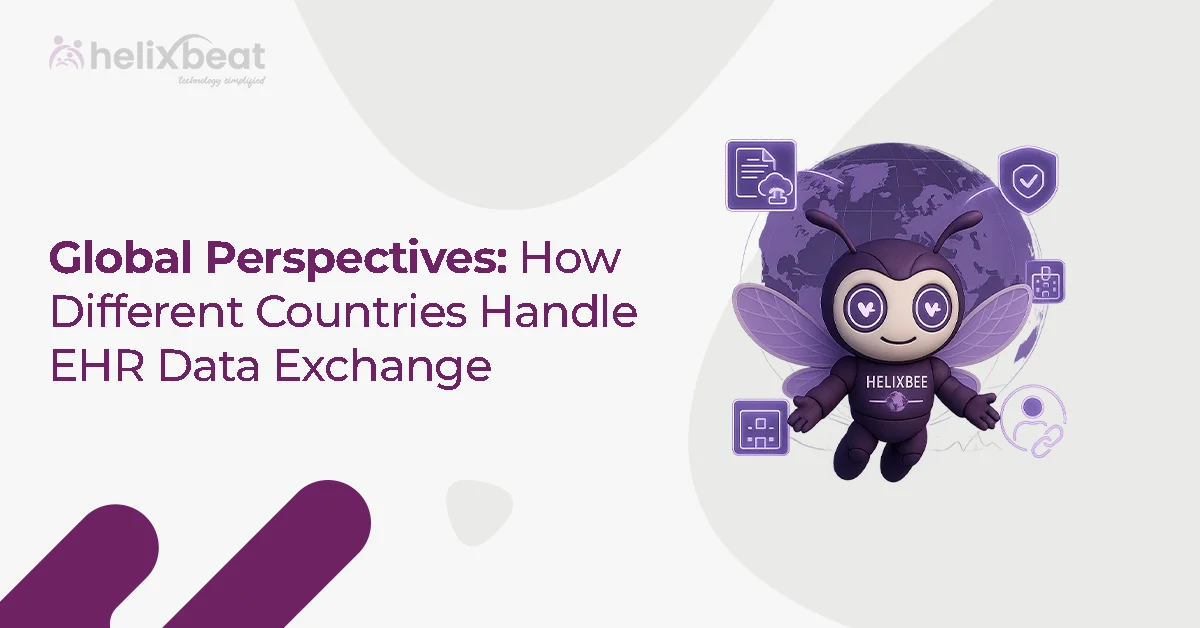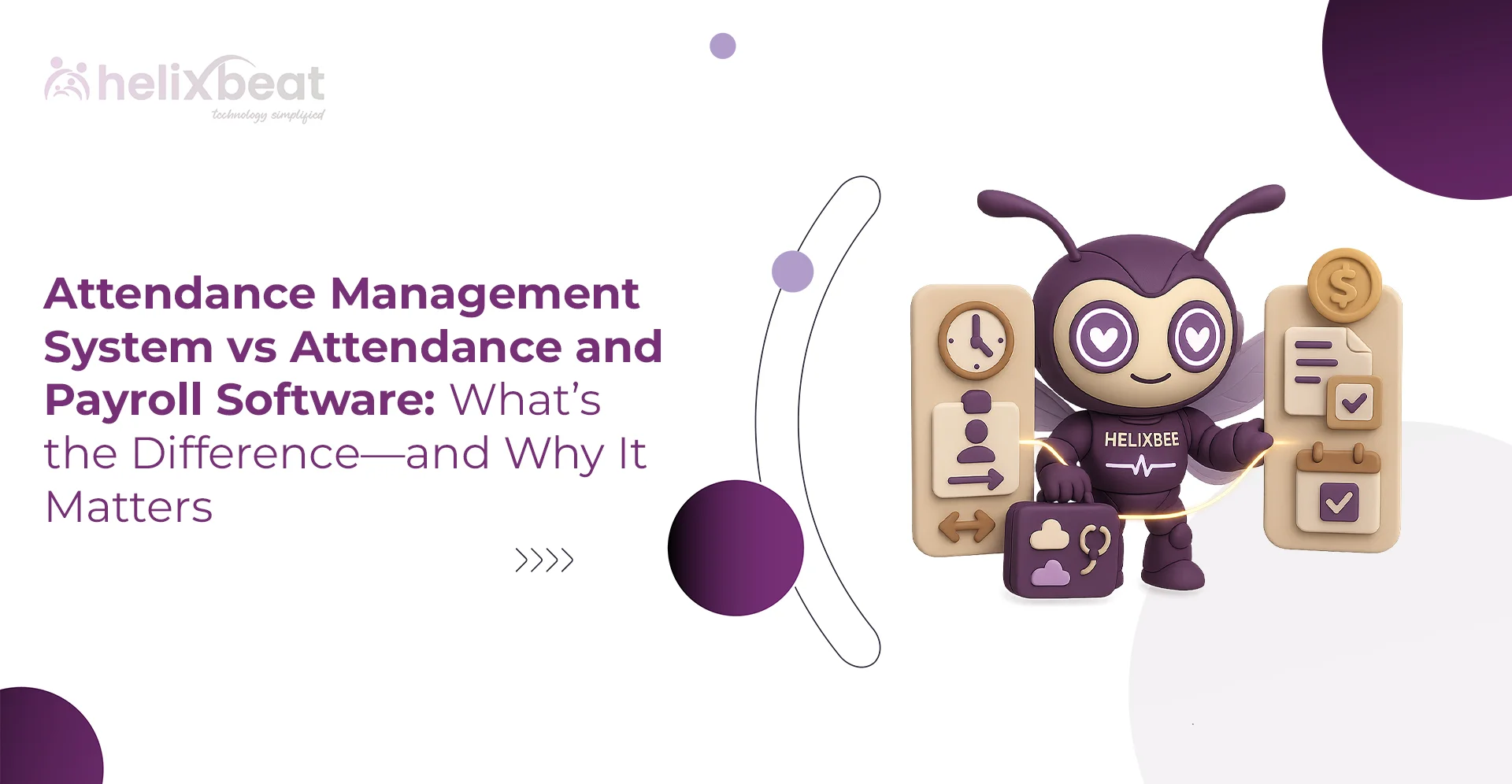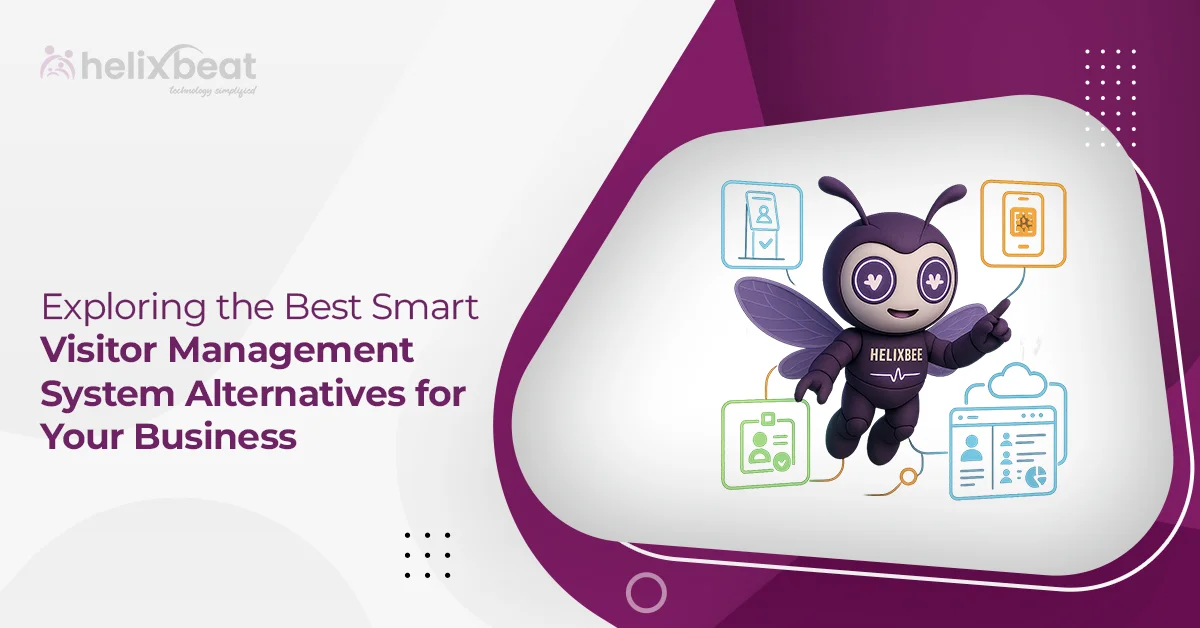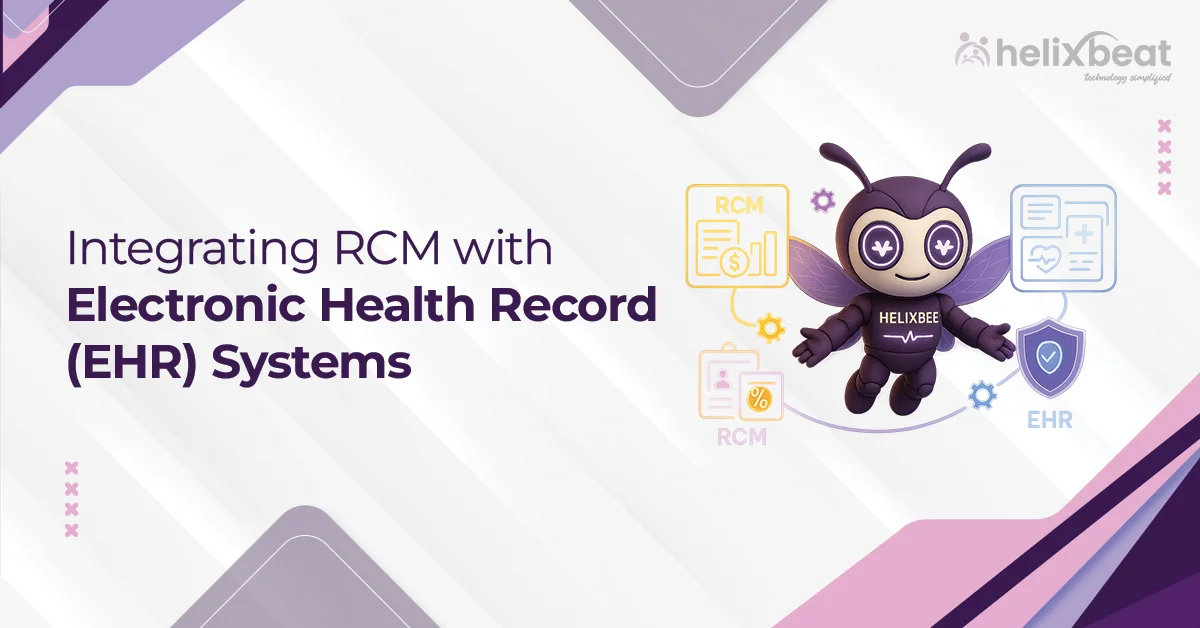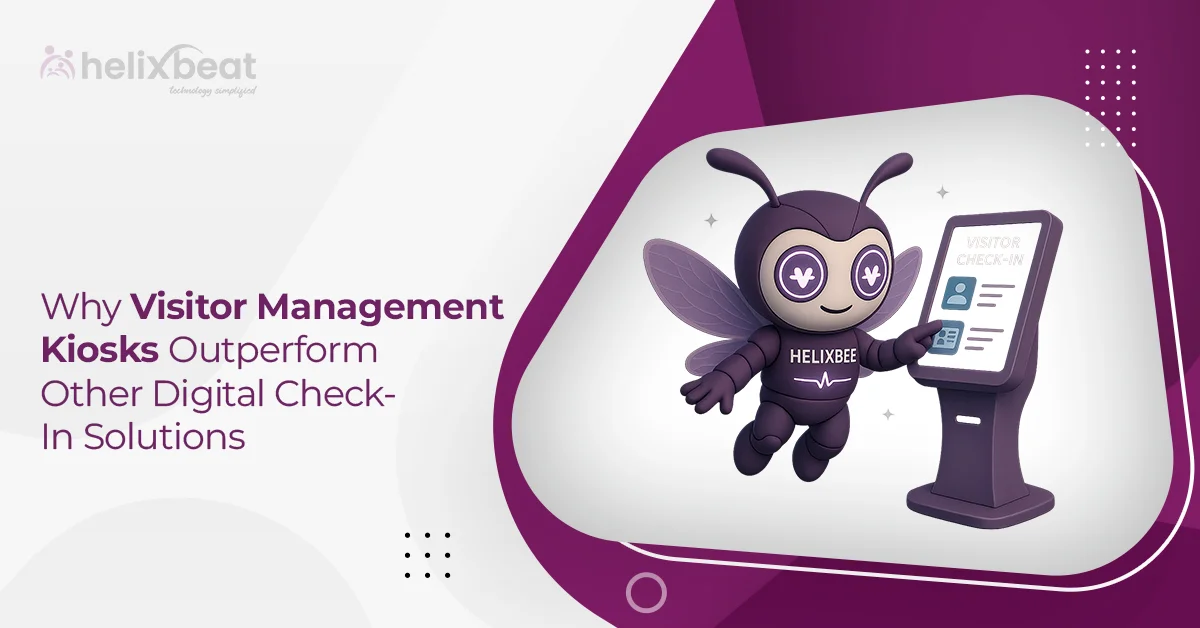What if your business could operate more efficiently, adapt faster to market changes, and scale seamlessly? The key to achieving all of this lies in ERP development. In today’s fast-paced digital world, businesses are faced with the challenge of staying ahead of the competition while managing their growing operations. Future-proofing your business ensures it remains resilient and adaptable to technological advancements and market shifts.
With a tailored ERP system implementation, your business can optimize its processes, reduce inefficiencies, and gain real-time insights that lead to smarter decision-making. In this blog, we will explore why ERP development is crucial for future-proofing your business and how companies like Helixbeat are providing custom solutions that enable businesses to thrive in the long term.
Table of Contents
What is Future-Proofing and Why is It Important for Your Business?
Future-proofing means preparing your business for ongoing growth, technological advancements, and market changes by creating adaptable and scalable systems. It’s about designing your business infrastructure to withstand external disruptions, embrace innovation, and remain competitive as new technologies emerge.
In the context of your business operations, ERP development is a vital aspect of future-proofing. A well-designed ERP system centralizes your core functions—finance, HR, supply chain, and more—into one cohesive platform. As your business grows, the ERP system will scale to meet your evolving needs, reducing the risk of outdated processes and enabling smooth adaptation to changes in technology and business practices.
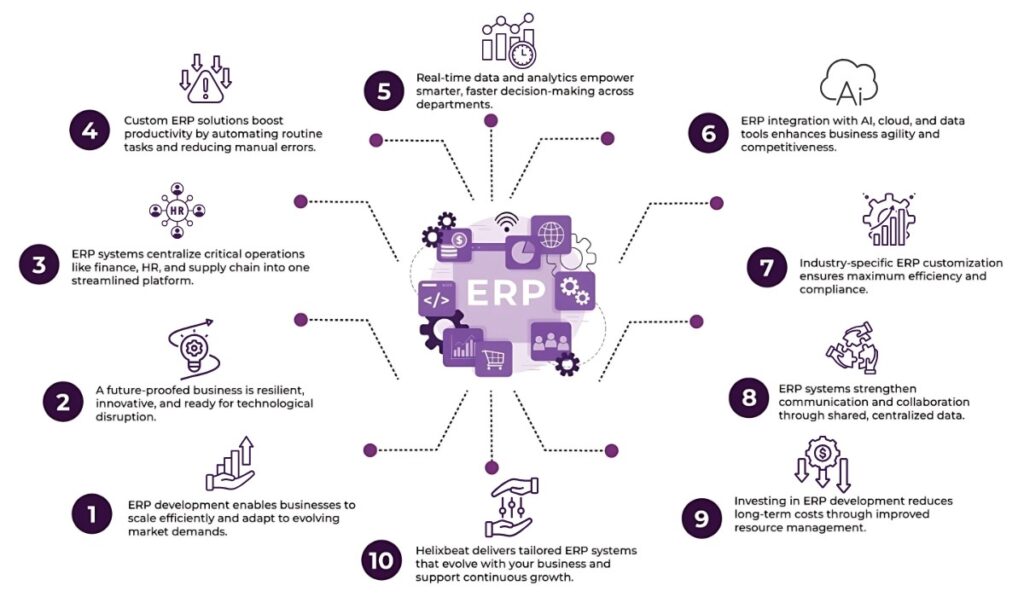
What is the Role of ERP Development in Future-Proofing Your Business?
ERP development plays a pivotal role in ensuring your business stays competitive and agile in a constantly changing environment. It supports future-proofing in the following ways:
Scalability: As your business expands, the ERP system can scale with it, accommodating increased data, users, and processes without requiring a complete overhaul.
Integration with Emerging Technologies: Modern ERP systems can integrate with cloud computing, AI, and data analytics, allowing businesses to leverage these technologies as they become more mainstream, enhancing their capabilities.
Operational Flexibility: With a centralized system, businesses can quickly adjust workflows, update processes, and implement new features without disrupting the entire organization, making enterprise resource planning adaptable to evolving needs.
Data-Driven Decisions: Real-time insights provided by ERP systems help businesses identify trends, respond to changes, and make decisions based on accurate, up-to-date information. This results in more informed, timely decision-making.
By investing in ERP development, you ensure that your business has a system in place that can adapt to both internal growth and external changes in the market, keeping you ahead of the competition. A well-implemented ERP system doesn’t just streamline operations; it also provides the flexibility and intelligence needed for long-term success and scalability.
How ERP Development Improves Efficiency in Your Organization?
One of the core benefits of ERP system implementation is the efficiency it brings to an organization. From automating routine tasks to optimizing workflows, ERP development enables businesses to streamline operations and improve productivity.
Centralized Data for Better Decision-Making
An ERP system consolidates your business data into one unified platform. This ensures that decision-makers have access to accurate, real-time information, improving the speed and quality of decisions. Whether it’s tracking inventory levels, monitoring sales performance, or evaluating financial health, all stakeholders can access the same data for better coordination.
Automation of Routine Tasks
ERP systems automate many manual processes, such as invoicing, payroll, and inventory management. This reduces human error and frees up time for your team to focus on higher-value tasks. For example, instead of manually processing orders, the ERP system can automatically generate invoices and update inventory levels as products are sold, leading to greater operational efficiency.
7 Key Factors That Make ERP Development a Game-Changer for Your Business
ERP development can transform your business by streamlining operations, improving communication, and enabling growth. Here are seven key factors that make ERP system implementation a game-changer for your business:
1. Scalability for Future Growth
As your business grows, your ERP system should be able to handle increased data and expanded operations. A scalable ERP solution allows you to easily add new users, departments, and features as needed. Helixbeat’s ERP development ensures that the system can grow with your business, adapting to new challenges and opportunities.
2. Improved Communication and Collaboration
When data is centralised in one system, it becomes easier for teams to share information and collaborate. Sales, finance, operations, and other departments can access the same data in real time, reducing misunderstandings and improving overall efficiency.
3. Increased Productivity
ERP systems improve productivity by automating manual tasks, streamlining processes, and reducing inefficiencies. Whether it’s handling customer orders, tracking employee attendance, or generating financial reports, ERP systems provide a centralized solution that allows your team to work more effectively.
4. Better Resource Management
With an ERP system, you can track resources like inventory, employees, and assets in real time, ensuring that nothing goes to waste. This improved visibility leads to better resource allocation and more efficient business operations.
5. Enhanced Reporting and Analytics
Modern ERP systems offer advanced analytics tools that help you make data-driven decisions. Whether you’re tracking sales performance or forecasting demand, ERP systems provide actionable insights that help you stay ahead of the competition.
6. Compliance and Risk Management
ERP systems automate compliance tasks and ensure that your business adheres to industry regulations. This reduces the risk of errors, fines, and penalties. Whether it’s managing financial reporting standards or keeping track of employee data, an ERP system helps businesses maintain compliance with minimal effort.
7. Cost Efficiency
By automating routine tasks, improving resource allocation, and streamlining operations, ERP systems help businesses reduce operational costs. Over time, the efficiency gained through ERP development can lead to significant cost savings and a higher return on investment.
Importance of Tailored ERP Solutions for Your Industry
While ERP systems offer universal benefits, businesses in different industries have unique needs. Customizing your ERP solution to fit the specific requirements of your industry ensures that it addresses the most critical aspects of your operations.
Custom ERP for Manufacturing
Manufacturers need ERP systems that can handle inventory management, production scheduling, and supply chain coordination. Custom ERP solutions help automate production processes, track raw materials, and manage quality control, improving overall efficiency and product quality.
Custom ERP for Retail and E-Commerce
Retailers need ERP systems to manage inventory, process customer orders, and track sales. A tailored ERP system for e-commerce can integrate with your online storefront, track customer preferences, and manage pricing and promotions, making it easier to respond to market demands.
Custom ERP for Healthcare
Healthcare providers need ERP systems to manage patient data, appointments, billing, and compliance. Custom ERP solutions streamline these processes, ensuring accurate record-keeping, faster patient processing, and better patient care, which is crucial for efficiency in healthcare settings.
Helixbeat’s ERP development offers customized solutions that cater to your industry’s specific needs. Whether you need to improve operational efficiency, enhance customer satisfaction, or ensure compliance, ERP system implementation can provide the tools you need to stay competitive.
How Helixbeat’s ERP Development Supports Your Business?
Helixbeat offers ERP development solutions that are customized to meet the unique needs of your business. Their approach ensures that the software integrates seamlessly with your existing tools, streamlines your workflows, and supports long-term growth.
Helixbeat’s process includes:
Requirements Analysis: Identifying your business needs and goals to create a tailored ERP system.
System Development: Building a robust, scalable, and user-friendly system to enhance productivity and collaboration.
Integration with Existing Tools: Ensuring the ERP system integrates smoothly with your existing platforms and tools for seamless operation.
Real-Time Reporting: Providing actionable insights through live dashboards and analytics, helping you make informed decisions.
User Training and Support: Offering ongoing support and training to maximize the system’s potential and ensure smooth adoption.
Helixbeat ensures that your ERP system evolves with your business, providing continuous optimization and updates post-deployment.
Future-Proof Your Business with ERP Development
ERP system implementation is more than just a technology investment; it’s a strategic move to future-proof your business. By centralizing operations, automating processes, and providing real-time insights, an ERP system can enhance productivity, improve decision-making, and drive long-term growth.
Investing in ERP development ensures that your business remains adaptable, scalable, and ready for the challenges of tomorrow. Helixbeat’s tailored ERP solutions offer the flexibility and support your business needs to stay competitive in a constantly evolving marketplace.
FAQs
1. How long does it take to implement an ERP system?
ERP implementation can take anywhere from a few months to a year, depending on the system’s complexity, customization, and the business’s size.
2. What industries benefit most from ERP development?
Industries like manufacturing, healthcare, retail, and e-commerce can benefit significantly from ERP systems tailored to their unique needs.
3. How much does ERP development cost?
The cost varies depending on the project’s scope, complexity, and customization. Tailored ERP solutions generally have a higher upfront cost but provide significant ROI in the long run.
4. What should I look for in an ERP development partner?
Look for a partner with industry experience, a proven track record, strong technical capabilities, and a customer-focused approach, like Helixbeat.
5. What are the benefits of cloud-based ERP systems?
Cloud-based ERP systems offer flexibility, scalability, lower infrastructure costs, and remote access to data, making them ideal for modern businesses.
6. How do I choose the right ERP system for my business?
Identify your business needs, evaluate different ERP features, consider scalability, and choose a vendor that offers strong post-deployment support.






